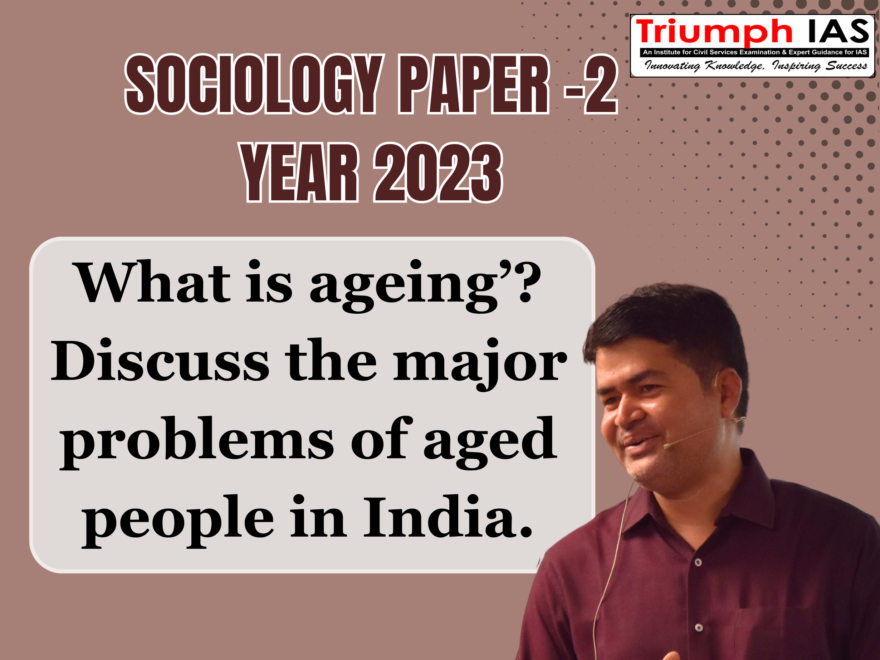What is ageing’? Discuss the major problems of aged people in India.
Section: B.
Sociology Paper 2023 Analysis.
Relevant for Paper-2 : POPULATION DYNAMICS
Question- 8 (C): What is ageing’? Discuss the major problems of aged people in India. (10 Marks)

|
Introduction: Define ageing and data about aged population in India according to census 2011 Main Body: Highlight the problems associated with aged people in India covering aspects like decline in their role and status, discrimination, abuse and ill treatment faced by aged, lack of social security and financial independence, feminisation of ageing, health related issues and lack of trained manpower to help old people lack of functional alternatives like old age homes, alienation and lack of mechanisms boosting active ageing. Conclusion: Successful ageing as highlighted by Rowe and Khan . |
Introduction
Ageing is a natural and inevitable process characterized by the gradual decline in physiological and psychological functions, leading to changes in an individual’s capabilities and appearance over time. The ageing process varies among individuals and is influenced by genetic, environmental, and lifestyle factors.
According to the Census of India 2011, the country witnessed a significant increase in the ageing population. The proportion of people aged 60 years and above is 8.6%. This demographic shift poses several challenges for India, as the elderly face a range of problems that impact their well-being and quality of life.
Main Body
- Decline in Role and Status: The traditional role of elders as respected family leaders and decision-makers is diminishing. With changing societal structures and values, the elderly often find themselves marginalized, leading to a decline in their social standing. This was highlighted by Max Weber when he said age would play lesser role in modern society.
- Discrimination, Abuse, and Ill-treatment: Loraine Green has highlighted that Aged individuals are sometimes subjected to discrimination, abuse, and ill-treatment, both within and outside their families. According to Longitudinal Ageing Study of India (LASI) Ill treatment /abuse is faced by 53 per cent of elderly people once in two month.
- Lack of Social Security and Financial Independence: Many elderly individuals lack adequate social security measures, and financial independence becomes a challenge. The absence of robust pension systems and limited access to healthcare services further exacerbates their vulnerability.
- Feminization of Ageing: The phenomenon of the feminization of ageing is observed as a higher proportion of elderly individuals are women. Women often face additional challenges due to factors like lower educational attainment, limited economic opportunities during their youth, and gender-based discrimination.
- Health-related Issues: Ageing is often accompanied by various health issues, including chronic diseases, cognitive decline, and mental health disorders. Access to affordable and quality healthcare services becomes crucial for maintaining the health and well-being of the elderly.
- Institutional ageism: Institutional ageism is systematic discrimination against the elderly by institutions. These may either be organisations specifically dedicated to elderly care or social institutions more generally such as workplaces.
- Lack of Trained Manpower: There is a shortage of trained caregivers and healthcare professionals to cater to the specific needs of the elderly. This shortage adds to the challenges faced by the aged population in accessing adequate support and care.
- Lack of Functional Alternatives like Old Age Homes: The concept of old age homes as an alternative living arrangement is still not widely accepted in India. Additionally, the availability and quality of such facilities are limited, leaving many elderly without viable options for living arrangements.
- Empty Nest Syndrome: it refers to the feelings of sadness, loneliness, and grief that parents may experience when their children leave home to live independently. As households increasingly transition into spaces occupied solely by elderly couples, the vulnerability of these individuals to criminal activities, such as robbery, becomes a pressing concern.
- Alienation and Lack of Mechanisms for Active Ageing: Elderly individuals often face social alienation, as changing lifestyles and urbanization can disrupt traditional community structures. Lack of mechanisms to promote active ageing, such as recreational programs, further contributes to feelings of isolation and loneliness.
Conclusion
Rowe and Khan talk about successful ageing, which is free from disease, unrestricted physical and cognitive activity and active ageing. It requires special motivation mobilisation from the government with developing the adaptational capacities. This can be achieved through strengthening the social security network, providing adequate infrastructure, and promoting intergenerational caregiving and support.
Related Blogs…
 |
 |

To master these intricacies and fare well in the Sociology Optional Syllabus, aspiring sociologists might benefit from guidance by the Best Sociology Optional Teacher and participation in the Best Sociology Optional Coaching. These avenues provide comprehensive assistance, ensuring a solid understanding of sociology’s diverse methodologies and techniques.
META TAGS:
Taylorism, Scientific Management, Frederick Taylor, Efficiency, Standardization, Specialization, Worker Exploitation, Organizational Hierarchy, Merits and Demerits, Contemporary Organizational Functioning, Sociology Question Paper, Sociology Question Paper 2023, Sociology Question Paper CYQ, Sociology Question Paper UPSC, What is Taylorism? Analyze its merits and demerits.
Why Vikash Ranjan’s Classes for Sociology?
Proper guidance and assistance are required to learn the skill of interlinking current happenings with the conventional topics. VIKASH RANJAN SIR at TRIUMPH IAS guides students according to the Recent Trends of UPSC, making him the Best Sociology Teacher for Sociology Optional UPSC.
At Triumph IAS, the Best Sociology Optional Coaching platform, we not only provide the best study material and applied classes for Sociology for IAS but also conduct regular assignments and class tests to assess candidates’ writing skills and understanding of the subject.
Choose The Best Sociology Optional Teacher for IAS Preparation?
At the beginning of the journey for Civil Services Examination preparation, many students face a pivotal decision – selecting their optional subject. Questions such as “which optional subject is the best?” and “which optional subject is the most scoring?” frequently come to mind. Choosing the right optional subject, like choosing the best sociology optional teacher, is a subjective yet vital step that requires a thoughtful decision based on facts. A misstep in this crucial decision can indeed prove disastrous.
Ever since the exam pattern was revamped in 2013, the UPSC has eliminated the need for a second optional subject. Now, candidates have to choose only one optional subject for the UPSC Mains, which has two papers of 250 marks each. One of the compelling choices for many has been the sociology optional. However, it’s strongly advised to decide on your optional subject for mains well ahead of time to get sufficient time to complete the syllabus. After all, most students score similarly in General Studies Papers; it’s the score in the optional subject & essay that contributes significantly to the final selection.
“A sound strategy does not rely solely on the popular
Opinion of toppers or famous YouTubers cum teachers.”
It requires understanding one’s ability, interest, and the relevance of the subject, not just for the exam but also for life in general. Hence, when selecting the best sociology teacher, one must consider the usefulness of sociology optional coaching in General Studies, Essay, and Personality Test.
The choice of the optional subject should be based on objective criteria, such as the nature, scope, and size of the syllabus, uniformity and stability in the question pattern, relevance of the syllabic content in daily life in society, and the availability of study material and guidance. For example, choosing the best sociology optional coaching can ensure access to top-quality study materials and experienced teachers. Always remember, the approach of the UPSC optional subject differs from your academic studies of subjects. Therefore, before settling for sociology optional, you need to analyze the syllabus, previous years’ pattern, subject requirements (be it ideal, visionary, numerical, conceptual theoretical), and your comfort level with the subject.
This decision marks a critical point in your UPSC – CSE journey, potentially determining your success in a career in IAS/Civil Services. Therefore, it’s crucial to choose wisely, whether it’s the optional subject or the best sociology optional teacher. Always base your decision on accurate facts, and never let your emotional biases guide your choices. After all, the search for the best sociology optional coaching is about finding the perfect fit for your unique academic needs and aspirations.
Follow us :
🔎 https://www.instagram.com/triumphias
🔎 https://www.youtube.com/c/TriumphIAS
🔎 https://t.me/VikashRanjanSociology
Find More Blogs…
| Compare and contrast Karl Marx’s and Max weber’s | Karl Marx- Historical Materialism |
| Position of Women In the Modern Indian Society | Sociology: Social system and pattern variables |
KEYWORD: What is ageing,What is ageing,What is ageing, What is ageing, What is ageing, What is ageing, What is ageing, What is ageing, What is ageing, What is ageing, What is ageing, What is ageing, What is ageing, What is ageing, What is ageing, What is ageing, What is ageing, What is ageing, What is ageing, What is ageing, What is ageing, What is ageing, What is ageing, What is ageing, What is ageing, What is ageing, What is ageing,



